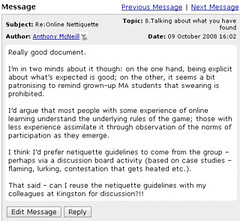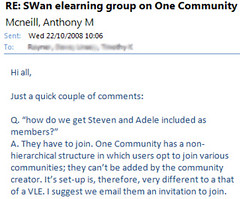- what aspects of this work make this an autoethnography.
- What are the advantages and disadvantages of this approach?
- How else could Flickr have been researched and what other methods would have been useful?
- This work was not specifically about literacy. How could a piece of research on Flickr look specifically at literacy?
1. Well, the author claims it's auto-ethnographic:
Drawing on Markham’s work (1998, 2004), I have thought of my work as partly ‘‘auto-ethnographic’’ (2007: 552)It's auto-ethnographic insofar as the author positions herself as a participant in the culture and practices under investigation. The author claims it's 'insider research':
This paper is informed by my own experiences with Flickr, my observations of others in that space. (2007: 551).There’s a history and a density of engagement:
I have been active on the site since it was launched in 2004. I am ‘‘embedded’’ in the culture of the site; I have uploaded several thousand images to Flickr; I belong to more than 100 groups and have around 150 ‘‘contacts’’ whom I only know from that space. (2007: 551)2. Advantages? Well, the author claims that:
Insider knowledge is required in order to move beyond a fascination with the exotic, or the alienation sometimes experienced by ‘‘outsiders’’ to digital cultures. That is, the practices need to be researched by those who see beyond the charisma or alienating potential of technologies.(2007: 552)So, auto-ethnographic approaches may avoid particular forms of misrepresentations that are produced by outsiders (Otherisation, the lure of the exotic etc.). Being deeply embedded in a micro-community of Flickr users (they're not a monolithic single community of amateur photographers), means a richness (or "thickness") of description.
Disadvantages? I'd better be careful what I write here as JD may get cross. I think JD's interest in the aestheticization of the everyday and the ordinary (street art, abandoned objects) leads her to neglect ways in which Flickr is used to display images of the exceptional or special too (weddings, birthdays, holidays etc.). So, being so much a part of one small community of users gives a great sense of detail but perhaps not the bigger picture.
For example, here's an image of popular Flickr tags from today:

What can we learn about the kinds of images uploaded to the site? Place names are popular suggesting that Flickr is used to upload holiday pictures. 'Wedding', 'party' and 'family' are prominent tags too suggesting that the staples of personal photography (weddings, birthday parties, family reunions) feature prominently.
3. How else could Flickr have been researched and what other methods would have been useful? I don't know.Could quantitative methods be used (e.g. frequency of use of particular tags as above)? However, I like JD's quasi-case study approach (looking at particular users, particular groups). Perhaps a case study analysis of a particular tag?
4. How could a piece of research on Flickr look specifically at literacy? Flickr is extraordinarily textual: titles, descriptions, tags, notes, comments, sets etc.. Literacy - in the 'lettered representation' (Kress) sense, is very much a feature of the site.
References
Davies, J. (2007). Display, Identity and the Everyday: Self-presentation through online image sharing. Discourse: Studies in the Cultural Politics of Education, 28(4): 549 - 564




